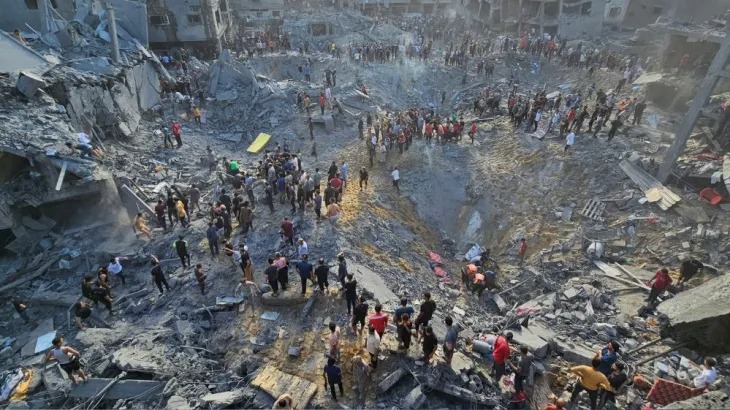The United Nations human rights office has declared that the recent Israeli airstrikes on Gaza’s Jabalia refugee camp may amount to war crimes. The densely-populated camp, located in Gaza City, bore the brunt of a missile strike on Tuesday, followed by a second bombing on Wednesday, leaving behind a scene of destruction and chaos. This devastating attack has ignited global outrage as the number of civilian casualties continues to rise, leading to serious questions about the proportionality of the Israeli response.
UN Expresses Grave Concerns Over Civilian Casualties
The scale of destruction in Jabalia has raised alarms within the international community. The Gaza Government Media Office has reported that at least 195 people have been confirmed dead, with over 100 individuals feared to be trapped beneath the rubble. Furthermore, a staggering 777 people have been injured in the aftermath of these relentless attacks. The situation has prompted the United Nations High Commissioner for Human Rights to express profound concerns about the attacks, citing a potential violation of international law due to the high number of civilian casualties.
Escalating Violence Sparks Global Outrage
The international community’s condemnation of these horrific attacks has been swift and resolute. UN Secretary-General Antonio Guterres expressed his deep dismay over the escalating violence in Gaza, especially in densely populated areas like Jabalia. The shocking loss of Palestinian lives, including women and children, in Israeli airstrikes has drawn vehement condemnation from UN officials, who describe the situation as “horrific and appalling.” UNICEF, the UN’s children’s agency, added its voice to the chorus of outrage, underscoring the dire humanitarian consequences of the conflict.
It remains unclear precisely how many children have perished in the Jabalia attacks, but the broader toll on Gaza’s children is undeniable. Since the outbreak of hostilities on October 7, more than 3,500 children have lost their lives, perpetuating a cycle of suffering that has persisted for years. Gaza, home to approximately 2.3 million people, has endured a 17-year blockade, intensifying the already dire humanitarian situation.
UN Calls for Humanitarian Ceasefire and Increased Aid to Gaza
As the world bears witness to the unfolding tragedy in Gaza, the United Nations humanitarian chief, Martin Griffiths, issued a stark warning that the world’s response to the situation must change. Griffiths asserted, “The world seems unable, or unwilling, to act,” emphasizing the need for a “step change” in addressing the crisis. The destruction of Jabalia and the broader conflict have reached a terrifying phase with dire humanitarian consequences.
Israel has defended its actions in Jabalia, claiming that it targeted a vast tunnel complex and eliminated “many Hamas terrorists,” including local commander Ibrahim Biari. In response, Hamas reported that seven captives, including three foreigners, were among the casualties. UN Secretary-General Guterres reiterated that all parties involved must adhere to international humanitarian law, including principles of distinction, proportionality, and precaution. He urgently called for an end to the violence, pain, and suffering that continue to plague Gaza.
While the attacks on Jabalia unfolded, the Rafah crossing on Gaza’s southern border with Egypt was briefly opened, primarily for the most severely injured and select foreign nationals. The opening allowed Philippe Lazzarini, head of the United Nations Relief and Works Agency for Palestinian Refugees (UNRWA), to enter Gaza for the first time since the conflict began. Lazzarini, with over 30 years of humanitarian experience, described the visit as “one of the saddest days” in his career. He witnessed unimaginable distress and unsanitary living conditions among those taking shelter in a school. Lazzarini underscored the pressing need for more international aid and a humanitarian ceasefire to avert further loss of life and ensure a brighter future for Gaza’s people.
The current humanitarian response is woefully inadequate, and the lack of fuel is taking a devastating toll on essential services. Urgent action is needed to end the suffering and pave the way for a lasting peace in this troubled region.
















